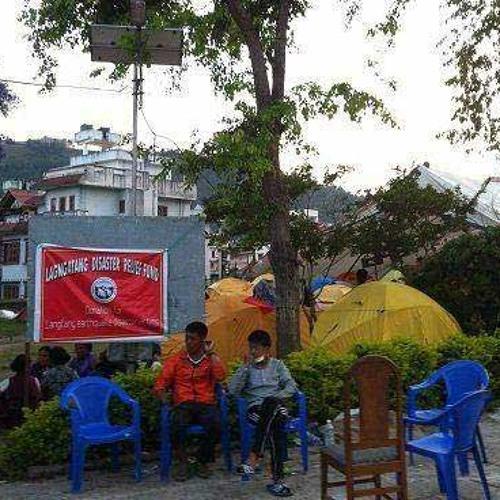HEADLINE
Nepal Avalanche Survivors Tell Their Stories
"The huge earthquake that hit Nepal last month triggered a huge landslide and avalanche. The entire Langtang Valley, 60 kilometres from the capital has been turned into rocky and snowy ruins due to the ruins due to avalanches. "
Vitri Angreni

When the first earthquake hit on April 25th, Sange Lama was in his tea shop with his family in Langtang, the remote but densely populated village of Langtang area. That is along a popular trekking route.
"The land started shaking. My wife said:"It’s an earthquake so sit down sit down!" I ran outside but one big celling beam hit my shoulder. I managed to run with my wife and we hide ourselves behind a big stone and saved ourselves,” he recalled.
When the shaking stopped he climbed 100 meters up the mountain to his guesthouse to save a German trekker.
He then heard a huge noise and he ran back to his family in the teashop.
But when he got there the village was gone.
"The village was completely buried under snow. It was white everywhere. Out of 100 houses, there was nothing, no human life, no birds and no cattle. All buildings had tin roofs and they had flown around in the air and cut people to pieces. I fainted and passed out after seeing all these people's hands, legs and heads everywhere,” he said.
When Sange woke up, he was told his mother and father didn’t survive the avalanche that hit Langtang valley immediately after the earthquake.
The avalanche also hit Thangsek, an hour down from the Langtang village.
Chhojangmo Tamang managed to save her three daughters, when the mountain of Ice fell under them.
But two of them had serious head injuries.
"It was a complete dark for five minutes after the avalanche. I only remember that I saw a huge wall of ice coming down on us. When I woke up, I found my daughters 10 minutes down the mountain and they were breathing,” she said.
They were rescued by an Army helicopter two days later and took to a hospital in Kathmandu where her daughter had to undergo major surgery.
Chhojangmo’s husband didn’t survive. Her neighbors said they saw his body under the ice.
There are no roads to Langtang region. The only way to get there is to walk or by helicopter.
Rescuers only reached the area two days after the first earthquake hit.
Ngawang Dorje who survived the quake and avalanche in Thangsek village says people were dying in front of his eyes.
"The first day, one helicopter came but then it turned back. It didn't rescue any people. Some of the people were half buried inside the avalanche. They were asking for water but we couldn't give it to them because everything was mixed with mud, stone and dust. Some of the people died without getting water,” he said.
In the last two weeks government rescue teams have brought hundreds of people from the Langtang valley to the capital.
They are now staying in tents in front of a Buddhist temple.
Chhojangmo, who is here with her three daughters says they want to go back to their mountain village.
"I like nothing here. We are from a cold place. This weather is too hot for us. The food is different, the water is different. We don't feel like eating. We are eating just to stay alive. The children are also asking me to back them back,” she said.
She like most of the villagers live off trekking tourism.
The deadly avalanche killed nine foreigners and many are still missing.
Chhojangmo wants to reopen her tea shop but she worries the trekkers will not come again.
"I still believe that I can survive by selling tea. Some says tourists won't come, some says more will come. I can only pray that the tourists come back to our village. We don't have land to farm. How can we survive without their help,” she said.
- Nepal earthquake
- Nepal avalanche
- Rajan Parajuli
- trekking tourism
- eng
Komentar
KBR percaya pembaca situs ini adalah orang-orang yang cerdas dan terpelajar. Karena itu mari kita gunakan kata-kata yang santun di dalam kolom komentar ini. Kalimat yang sopan, menjauhi prasangka SARA (suku, agama, ras dan antargolongan), pasti akan lebih didengar. Yuk, kita praktikkan!